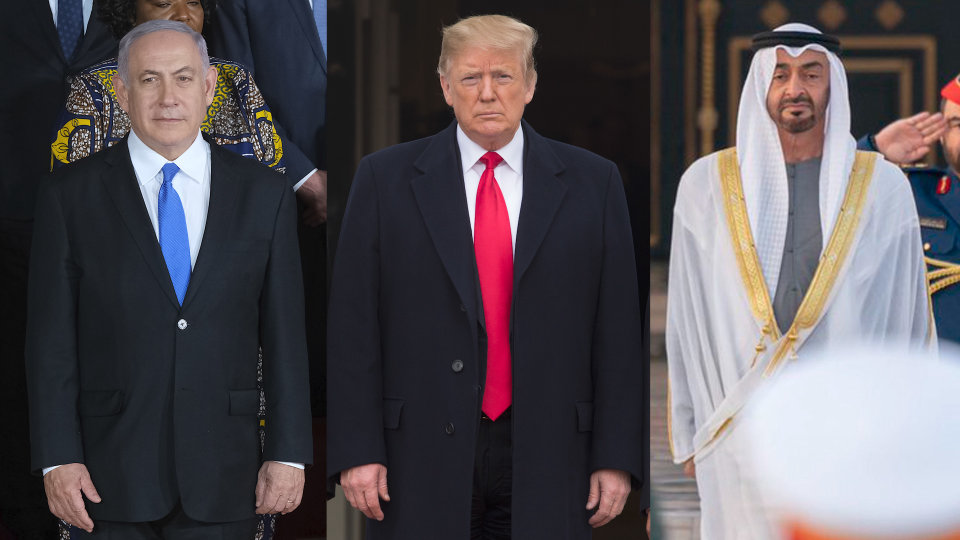Australia/Israel Review
Media Microscope: The Art of the Deal
Sep 8, 2020 | Allon Lee

The historic August 13 announcement that the UAE will establish normalised diplomatic relations with Israel appeared to receive a somewhat muted response by a media uncertain of how to react to a peace accord not involving the Palestinians and brokered by two figures many in the media love to hate, Donald Trump and Binyamin Netanyahu.
The Australian (Aug. 15) editorialised that the deal has proved “utterly wrong” the “doomsayers’ forecasts of a Middle East firestorm following…Trump’s 2018…recognis[ing] Jerusalem as Israel’s capital and mov[ing] the US embassy [there]… Arab states are unmoved by the claptrap of anti-Israel campaigns such as the boycott, divestment, sanctions movement.”
Australian Foreign Editor Greg Sheridan noted, “This… deal could not have come about under… the Obama White House [which] would have thought diplomatic recognition of Israel by its neighbours was leverage to be withheld until Israel made further concessions.”
In the Sydney Morning Herald (Aug. 16), former Australian ambassador to Israel Dave Sharma wrote, “the agreement itself speaks to a growing recognition among the Middle East’s major actors that they can no longer rely on Washington alone to keep the peace in the region.” Earlier, Sharma said the UAE’s role as a regional transport and logistics hub, means the deal is a “game changer,” ABC News Radio (Aug. 14).
US analyst and past AIJAC guest Michael Rubin told “The Bolt Report” on Sky News (Aug. 18) this is the “first warm peace” between an Arab state and Israel but its significance “is being downplayed out of animosity for Donald Trump.” He said Arab countries no longer want to “sacrifice their national interests” whilst Palestinian leaders keep rejecting peace deals.
US President Barack Obama’s Ambassador to Israel Daniel Shapiro was quoted in the Australian Financial Review (Aug. 15) saying normalisation between Israel and the Arab states was “a long-term, bipartisan goal” which “everyone should welcome”. On Aug. 21, the paper ran Palestinian-American analyst Hussein Ibish who said the deal is part of the UAE’s foreign policy vision “that emphasises religious tolerance, ethnic diversity, social and cultural openness, and confident Arab engagement with the outside world.”
The Executive Council of Australian Jewry’s Alex Ryvchin said that, while US and EU leaders cosied up to Iran, Gulf States “observed that the world leader most outspoken and fearless in opposing the Iran deal, and the only one who seemed to truly share their understanding of the brutal malevolence of the Iranian mullahs, was the Israeli Prime Minister,” Australian (Aug. 15).
Former Middle East correspondent Tony Walker told ABC News Radio (Aug. 15) the deal is a “very significant breakthrough obviously,” but predicted likeminded states will wait to see what the consequences are for the UAE.
On Channel 7 “Sunrise” (Aug. 14) commentator Keith Suter listed the deal’s pros but predicted “peace in the Middle East is [still] a long, long way off.”
Commentator Michael Friedson told ABC TV “The World” (Aug. 17) the Palestinians are facing “another crisis moment” and must “decide whether to get with the program or be left behind again” because “there is nothing…to indicate that anybody is going to… take their side.”
A hostile Observer editorial in the Guardian Australia (Aug. 17) blasted the deal, saying that “any rapprochement built on the ruins of Palestinian hopes of an independent state is suspect and fragile. This flawed deal may yet come to be seen as a historic mistake.”
The Herald Sun didn’t cover the initial announcement whilst the Age’s reporting was limited to a New York Times article (Aug. 15) which included veteran US Middle East envoy Dennis Ross saying the UAE pushed for a deal “after concluding that Netanyahu was bent on annexation” but they “had to give Trump a reason to say no.”
The Canberra Times (Aug. 15) welcomed the deal as a “step in the right direction”, but added, “nobody is shouting ‘peace’ yet and nor should they,” and appeared to imply Israel is to blame for the insolubility of the Israeli-Palestinian conflict.
Academic Lana Tatour told ABC TV “News” (Aug. 14) the deal is “unprecedented” in “reward[ing]” Israel with full diplomatic relations after it made “threats to illegally annex Palestinian territory against international law.”
However, an online ABC report (Aug. 17) noted the practical and immediate benefits of the deal, with the UAE no longer blocking direct telephone calls between the two countries.
Tags: Australia, Media/ Academia






